When you’ve been injured due to someone else’s actions, proving negligence is crucial to securing compensation. An experienced personal injury attorney in texas plays a vital role in establishing that another party’s carelessness led to your harm. Understanding the four key elements of negligence can help clarify how your attorney builds a strong case on your behalf.
Table of Contents
Duty of Care
The first step in proving negligence is establishing that the defendant owed you a duty of care. This legal obligation means that the defendant was required to act in a way that would not cause harm to others. For instance, drivers have a duty to operate their vehicles safely and follow traffic laws to prevent accidents. Similarly, property owners must maintain their premises to ensure they are safe for visitors. A personal injury attorney will assess the circumstances to determine if such a duty existed in your case.
Breach of Duty
Once a duty of care is established, your attorney must demonstrate that the defendant breached this duty. A breach occurs when the defendant fails to meet the standard of care expected in the given situation.
For example, a driver running a red light or a store owner neglecting to clean up a spill promptly may be considered breaches of duty. Your attorney will gather evidence such as witness statements, surveillance footage, and expert testimony to show that the defendant’s actions fell short of the expected standard.
Causation
Proving causation involves showing that the defendant’s breach of duty directly caused your injuries. This element is often divided into two parts:
An attorney will work with experts to establish a clear link between the defendant’s breach and your injuries, ensuring that causation is firmly established.
Damages
Finally, your attorney must prove that you suffered actual damages as a result of the defendant’s negligence. Damages can be economic, such as medical bills and lost wages, or non-economic, like pain and suffering. Your attorney will compile medical records, employment records, and other relevant documents to quantify the damages you’ve incurred. This evidence is essential for determining the compensation you may be entitled to.
Gathering Evidence
To prove negligence, your attorney will collect various forms of evidence, including:
This comprehensive approach helps build a compelling case that demonstrates the defendant’s liability.
Conclusion
Proving negligence is a multi-step process that requires a thorough understanding of the law and meticulous attention to detail. An attorney is instrumental in navigating this process, gathering evidence, and presenting a compelling case to secure the compensation you deserve. If you’ve been injured due to someone else’s negligence, seeking legal counsel promptly can significantly impact the outcome of your case.


